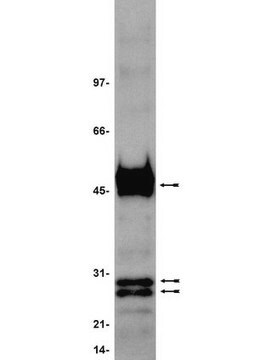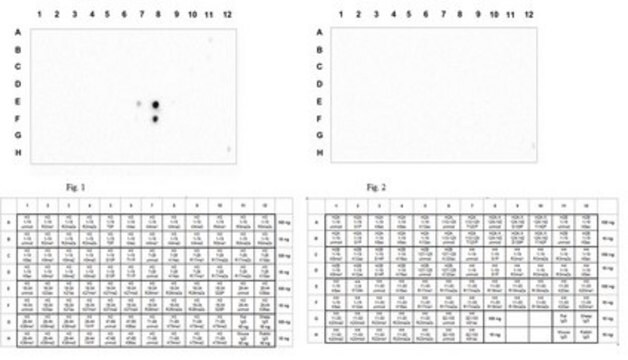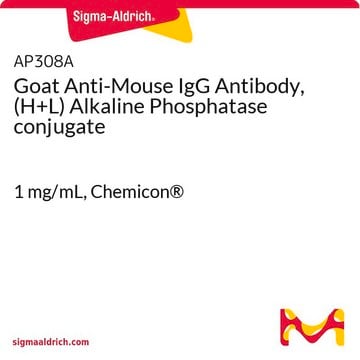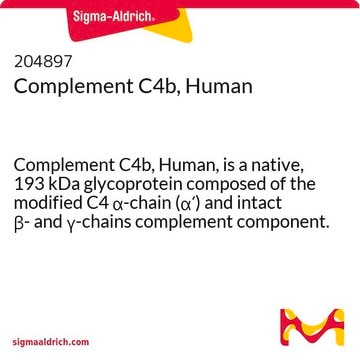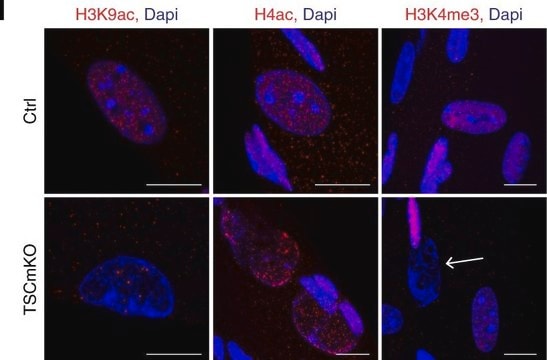16-200
Anti-Histidine Tagged Antibody, clone 4D11, biotin conjugate
clone 4D11, Upstate®, from mouse
Sign Into View Organizational & Contract Pricing
All Photos(1)
About This Item
UNSPSC Code:
12352203
eCl@ss:
32160702
NACRES:
NA.43
Recommended Products
biological source
mouse
Quality Level
conjugate
biotin conjugate
antibody form
purified antibody
antibody product type
primary antibodies
clone
4D11, monoclonal
species reactivity (predicted by homology)
all
manufacturer/tradename
Upstate®
technique(s)
western blot: suitable
isotype
IgG2aκ
shipped in
dry ice
target post-translational modification
unmodified
Gene Information
human ... HRG(3273)
Specificity
Recombinant proteins containing either an amino or carboxyl-terminal HHHHHHGS epitope tag, which is encoded by most His6 tag expression vectors. NOTE: The [GS] amino acids on the epitope tag are required for antibody recognition.
Immunogen
N-terminal His-tagged and truncated TRAP protein (amino acids 26-248) from P. falciparum expressed in E. coli. (catalog #05-531), clone 4D11.
Application
Anti-Histidine Tagged Antibody (anti His antibody), clone 4D11, biotin conjugate is an antibody against Histidine Tagged for use in WB.
Research Category
Epitope Tags & General Use
Epitope Tags & General Use
Research Sub Category
Epitope Tags
Epitope Tags
Quality
Routinely evaluated in western blot to detect recombinant N-terminal and C-terminal His-tagged proteins
Target description
The apparent molecular weight is related to the tagged protein.
Physical form
PBS, 0.05% sodium azide before the addition of glycerol to 30%
Protein G Purified
Storage and Stability
1 year at -20°C
Legal Information
UPSTATE is a registered trademark of Merck KGaA, Darmstadt, Germany
Disclaimer
Unless otherwise stated in our catalog or other company documentation accompanying the product(s), our products are intended for research use only and are not to be used for any other purpose, which includes but is not limited to, unauthorized commercial uses, in vitro diagnostic uses, ex vivo or in vivo therapeutic uses or any type of consumption or application to humans or animals.
Not finding the right product?
Try our Product Selector Tool.
Storage Class Code
10 - Combustible liquids
WGK
WGK 2
Certificates of Analysis (COA)
Search for Certificates of Analysis (COA) by entering the products Lot/Batch Number. Lot and Batch Numbers can be found on a product’s label following the words ‘Lot’ or ‘Batch’.
Already Own This Product?
Find documentation for the products that you have recently purchased in the Document Library.
Cation exchange chromatography in antibody purification: pH screening for optimised binding and HCP removal.
Andreas Stein,Andre Kiesewetter
Journal of Chromatography. B, Analytical Technologies in the Biomedical and Life Sciences null
Jie He et al.
Oncology reports, 26(5), 1305-1313 (2011-07-20)
In the present study, we investigated the prognostic roles of the O6-methylguanine-DNA methyltransferase (MGMT) gene methylation status, the protein profiles of MGMT, and the glioma stem cell (GSC) marker CD133 in malignant glioma resistance to radiotherapy. The proliferation of glioma
Cloning and characterization of GDP-perosamine synthetase (Per) from Escherichia coli O157:H7 and synthesis of GDP-perosamine in vitro.
Guohui Zhao,Jun Liu,Xiang Liu,Min Chen,Houcheng Zhang,Peng George Wang
Biochemical and biophysical research communications null
K J Robson et al.
The EMBO journal, 14(16), 3883-3894 (1995-08-15)
Plasmodium sporozoites collected from oocysts, haemocoel and salivary glands of the mosquito show profound differences in their biological properties such as motility, ability to induce protective immune response and infectivity for vertebrate host cells. Sporozoites from salivary glands are much
Maya Remington et al.
Neuro-oncology, 11(1), 22-32 (2008-09-25)
First-line therapy for patients with glioblastoma multiforme includes treatment with radiation and temozolomide (TMZ), an oral DNA alkylating chemotherapy. Sensitivity of glioma cells to TMZ is dependent on the level of cellular O(6)-methylguanine-DNA methyltransferase (MGMT) repair activity. Several common coding-region
Our team of scientists has experience in all areas of research including Life Science, Material Science, Chemical Synthesis, Chromatography, Analytical and many others.
Contact Technical Service